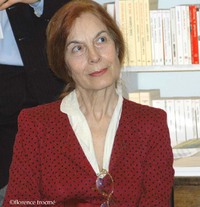 As with much French poetry, the idée fixe of King of a Hundred Horsemen concerns the problematics of desire, and several of the passages are so euphonic in the original that quoting from the translation may lessen the overall effect for a potential reader.
As with much French poetry, the idée fixe of King of a Hundred Horsemen concerns the problematics of desire, and several of the passages are so euphonic in the original that quoting from the translation may lessen the overall effect for a potential reader.
Translators’ prefaces are generally a useful, if not necessary addition to the work itself, here presented on facing pages: poet-translator Marilyn Hacker’s contextualization not only of Marie Étienne’s literary career, prior to her formal introduction to an English speaking audience via King of a Hundred Horsemen, Étienne’s eleventh book of poems, but of 20th and 21st century French poetry, makes for a fascinating essay in and of itself.
Each of the nine sections (themselves comprised of individual prose sonnets) wrestle with the timeless themes of war, multiculturalism, and the poet’s own international history (Étienne was born and spent her childhood in what is now Vietnam and was educated in France and Dakar). Throughout, Étienne evokes—and occasionally interpolates textually with—figures as varied as Tristan Tzara and Marina Tsvetaeva.
Prose poetry is a form in which French poets, most notably Baudelaire, have demonstrated mastery (the 2009 anthology Prose Poems of the French Enlightenment serving as a recent compendium): Étienne’s gender is not irrelevant in a shadow of this magnitude. Hacker’s description of Étienne’s “I” as a voice marked as a woman’s while engaged in quests and exploration rather than self-examination is apt indeed: while anchored occasionally by lines that seem to advance a guiding trope (“I am a displaced person in a country at war”), the destabilized “I” referenced by Hacker unsettles her reader’s expectations for a consistent, or at least consistently inconsistent “I,” however supreme a fiction such an “I” may be.
 The resultant lability—and subterfuge quality—of Étienne’s work recalls the paroxysms of Kristeva, Kafka, Camus and other writers whose work took place at the margins of language, culture and thought. Fittingly, in the section entitled “A Witness Disappears,” the “I” gathers itself into a cohesive representation, only to splinter apart again. “I roamed from room to room, all empty, I found a photograph, it was of a man who had governed the palace . . . Who had taken it of himself in a mirror. The camera replaced the face, it was the face.” Traces of intentionality on behalf of one of the text’s many speakers (including recurring characters “Ang” and “Lam”) can nonetheless be found (“I’m seeking the song, I must find it, find it absolutely, it’s an idea, it’s my idea . . . The song is old, barely a memory that persists and burns, that cannot be grabbed like a feather at the fair”): a narrative goal is also, in a way, carried through. “Struggling against the even rhythm, one no longer holds one’s hand to one’s heart . . . One makes little piles, with no punctuation . . . Since one is benevolent, one says song and light.”
The resultant lability—and subterfuge quality—of Étienne’s work recalls the paroxysms of Kristeva, Kafka, Camus and other writers whose work took place at the margins of language, culture and thought. Fittingly, in the section entitled “A Witness Disappears,” the “I” gathers itself into a cohesive representation, only to splinter apart again. “I roamed from room to room, all empty, I found a photograph, it was of a man who had governed the palace . . . Who had taken it of himself in a mirror. The camera replaced the face, it was the face.” Traces of intentionality on behalf of one of the text’s many speakers (including recurring characters “Ang” and “Lam”) can nonetheless be found (“I’m seeking the song, I must find it, find it absolutely, it’s an idea, it’s my idea . . . The song is old, barely a memory that persists and burns, that cannot be grabbed like a feather at the fair”): a narrative goal is also, in a way, carried through. “Struggling against the even rhythm, one no longer holds one’s hand to one’s heart . . . One makes little piles, with no punctuation . . . Since one is benevolent, one says song and light.”
As with much French poetry, the idée fixe of this book concerns the problematics of desire (“Lacking limits, the gaze has no where to stop”), and several of the passages are so euphonic in the original that quoting from the translation (subtle and expert, albeit subdued in parts) may lessen the overall effect for a potential reader. King of a Hundred Horsemen so clearly manifests a form of jouissance, co-extensive here with transnational consciousness, that to demand narratological consistency from such an “I” seems absurd.



